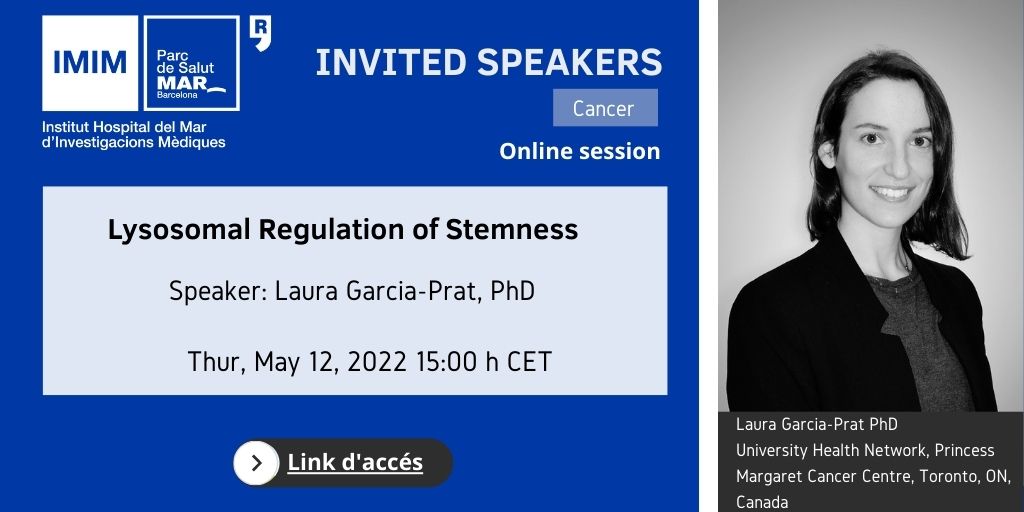
12/05/2022
Virtual, a les 15:00h
Us convidem al pròxim IMIM Invited speakers Seminar, que tindrà lloc el dijous 12/05/2022 a les 15:00 h en format virtual. El títol serà "Lysosomal Regulation of Stemness", a càrrec de la Dra. Laura Garcia-Prat, University Health Network, Princess Margaret Cancer Centre, Toronto, ON, Canada.
________________________________________________________________
We invite you to the next IMIM Invited speakers Seminar, which will take place on Thursday 05/12/2022 at 15:00 h in virtual format. The title will be "Lysosomal Regulation of Stemness", by Dr. Laura Garcia-Prat, University Health Network, Princess Margaret Cancer Centre, Toronto, ON, Canada.


Abstract:
Proteostasis programs centered at autophagy and lysosome homeostasis have emerged as crucial quality control mechanisms in adult stem cells. However, how these protective mechanisms maintain stem cell self-renewal is poorly understood. Muscle stem cells (MuSCs) and hematopoietic stem cells (HSCs) share self-renewal properties that are tied to quiescence, but are adept at activating and maintaining tissue homeostasis in response to stress stimuli. We previously showed that basal autophagy is essential to maintain MuSCs in quiescence. Lack of autophagy in aged MuSCs caused entry into senescence by loss of proteostasis, increased mitochondrial dysfunction, and oxidative stress, and resulted in the numerical and functional decline of MuSCs (García-Prat et al., Nature 2016). Moreover, we demonstrated that quiescent MuSCs exist as two functionally and metabolically distinct subsets controlled by FoxO transcription factors: CD34High with self-renewal properties and CD34Low more committed to myogenic differentiation (García-Prat et al., Nature Cell Biology 2020). Through multiomic analysis, we showed that FoxO activates autophagy genes while repressing a "primed-state program" in quiescent CD34High MuSCs, which includes genes related to translation, cell cycle, OxPHOS and muscle differentiation. Depletion of FoxO signaling results in loss of MuSC quiescence and spontaneous differentiation of CD34High MuSC population leading to impaired muscle regeneration. Concerning HSCs, we showed that lysosomes are much more than mere endpoint stations of autophagic cargo in human HSCs and are in fact sophisticated signalling centres able to control quiescence maintenance, enhance self-renewal, and govern early lineage choices (Garcia-Prat et al., Cell Stem Cell 2021). We revealed the major molecular players regulating this stem cell-associated lysosomal activity, TFEB and MYC, and showed that they play antagonistic roles in HSC biology. Mechanistically, we described a novel regulatory circuit for demand-adapted regulation of the earliest steps in human hematopoiesis through endolysosomal degradation of membrane receptors. Collectively, our results from two distinct adult stem cell types demonstrate that proteostatic mechanisms centered at the lysosome are important for preserving stem cell homeostatic quiescence and for rapidly responding to environmental stresses, and thus for sustaining organ and tissue regeneration.
© Institut Hospital del Mar
d'Investigacions MèdiquesLegal Notice and Privacy Policy | Cookie Policy | Site Index | Accessibility | Find Us | Contact